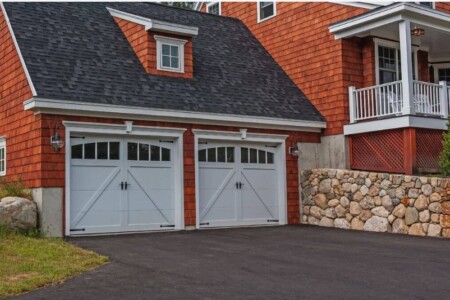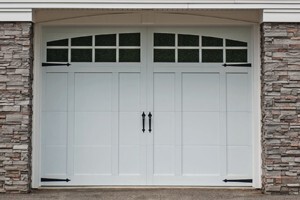
We replaced our peeling wood-composite garage doors with steel, and we could not be happier. We chose from steel, vinyl, fiberglass, wood composite, and aluminum/glass. Steel beat all other materials with ease.
 Steel is the best material for a garage door. An insulated steel garage door has the best R-value and durability. Unlike other materials, steel performs well in extreme cold, extreme heat, and moist climates. While wood is the most attractive garage door material, it is also the most expensive, and the most likely to fail.
Steel is the best material for a garage door. An insulated steel garage door has the best R-value and durability. Unlike other materials, steel performs well in extreme cold, extreme heat, and moist climates. While wood is the most attractive garage door material, it is also the most expensive, and the most likely to fail.
Aluminum & glass doors are best for someone who wants their garage to be an open terrarium. Fiberglass doesn’t compete on price, durability, or aesthetics.
Takeaway

Steel is the most durable. Wood is the prettiest. Aluminum is the cheapest. Even if the door comes insulated, you can insulate more using an insulation kit. Learn more in our article: Should You Insulate the Garage Door? Read This Before You Do
Steel Garage Doors: Best Insulation and Least Maintenance

Steel is the most durable garage door material. It does not crack, chip, warp, or mold. Lower gauge/higher thickness steel does not dent too easily. You do not have to paint steel, but it will last much longer if you do prime and paint.
While steel by itself is a poor insulator, the right design and insulation can give doors a good R-value. Steel doors consist of two steel panels. With 2 inches of foam board insulation inside, the R-value goes up.
Insulated steel garage doors do a much better job at maintaining garage temperature than do wood or aluminum.
Steel doors can look like wood but don’t burn like wood. A good steel door is also significantly cheaper than a good wood door.
Steel Garage Door Benefits
- durable
- can be very attractive
- affordable
- good R-value with core insulation
- can paint/stain
- does not crack
- does not yellow
- does not fade
- not noisy in the wind
- does not chip
- does not warp
- does not expand/contract
- does not rot
- does not swell
- does not scratch
- does not mold
- pests do not damage
- no greenhouse effect
- not heavy
- not restricted to mild climates
- no privacy issues/security issues (except through windows)
- not flammable
- easy maintenance
Steel Garage Door Issues
- must maintain if painted or stained
- coat steel to hinder rust
- no R-value without insulation
- can rust
- can dent
Overcome Steel Garage Door Issues
- Heavier gauge steel dents less
- Core insulation adds excellent R-value
- Galvanize, prime, and paint, regularly inspect and repair to reduce rust
Wood Garage Doors: Most Beautiful and Most Expensive

I gravitated to the most expensive garage door in the showroom. The deep, rich wood shine reached into the depth of the grain. It seemed like a good garage door to protect a Rolls Royce.
Me: “How much is this one?”
Salesperson: “It starts at $4,000.”
Me: “Why is it so expensive?”
Salesperson: “It’s wood.”
Wood has the extremes covered. It’s the most expensive, the most attractive, requires the most maintenance and has the most problems.
Garage doors don’t stay beautiful without a lot of work. You have to re-stain a wood door every few years. That’s just one downside in a long list.
Not only are wood doors expensive, but they’re also weak. They can rot, warp, dent, swell, and mold. They expand in the heat and contract in the cold, both of which ruin any insulation efforts.
Wood doors are flammable, so they add fuel to any house fire.
Not all wood garage doors start at $4,000. However, as the price goes down, so does the inherent beauty that draws you to wood in the first place.
By the time the price gets low enough to be affordable, a wood garage door is just another garage door. There’s nothing particularly attractive about a reasonably priced wood garage door. It has all of the downsides of a wood door, without the sumptuous beauty of a high-end cedar door.
Manufacturers don’t think too highly of wood’s durability, judging by their warranties. Clopay offers 1-year on wood door construction; 1-year on the paint; and 2 years on the stain.
Overhead Door offers a 1-year warranty on all aspects of their wood garage doors.
C.H.I. Overhead Doors offers a 1-year warranty on their wood overlay doors. So the manufacturers are unanimous that a wood door is not going to last very long. C.H.I. and Clopay limit their warranties further you install your garage doors near ocean salt spray.
Wood Garage Door Benefits
- most attractive
- paint/stain
- does not rust
- does not delaminate
- does not crack
- does not yellow
- no noise in the wind
- does not break
- no greenhouse effect
- no privacy issues/security issues (except through windows)
Wood Garage Door Issues
- not durable
- most expensive
- hardest to maintain
- not very insulating
- can fade
- can dent
- can warp
- can expand/contract (lessens R-value)
- can rot
- can swell
- can scratch
- can mold
- can get pest damage
- can get water damage
- very heavy (hard to operate manually)
- best in mild climates
Overcome Wood Garage Door Issues
- do not install in humid climates
- do not install where there are large temperature swings (hot to cold, cold to hot)
- wash, re-paint, or re-stain regularly
- get an extra bulky garage door opener to handle the weight
- add insulation to the interior in addition to getting installation installed in the core
Fiberglass Garage Doors: Medium Price and Medium Maintenance

Fiberglass doesn’t swell, rot, or mold. So long as you install these doors in the right environment, fiberglass garage doors can last a long time. The issue is that they’re best suited only to mild climates.
When subjected to high wind or extreme cold or moist and salty air, fiberglass doors are more likely to fade, yellow, and chip (delaminate).
A broken fiberglass door is not fixable. You throw it away and get a new one. That’s a result of the fiberglass manufacturing process.
C.H.I. guarantees their fiberglass garage doors for 3 years but specifically excludes exposure to salt and moisture.
Clopay doesn’t sell fiberglass garage doors.
Overhead also excludes salt-water spray exposure. Their fiberglass garage door warranty gives limited lifetime protection on the steel portion of their fiberglass garage doors.
Overhead guarantees the fiberglass door for three years so long as you apply their top coating every two years.
Fiberglass Garage Door Benefits
- durable
- affordable
- insulates
- can paint/stain
- does not rust
- does not break
- does not warp
- does not rot
- does not swell
- does not scratch
- does not mold
- pests do not damage
- does not get water damaged
- does not have a greenhouse effect
- lightweight
- no privacy issues/security issues (except through windows)
- not flammable
- easy to maintain
- best in mild climates
Fiberglass Garage Door Issues
- not durable
- often not attractive
- can delaminate
- can crack
- can yellow
- can fade
- can be noisy in the wind
- can dent
- can chip
- cannot be repaired (must replace)
- sometimes not warrantied in coastal areas
- do not install in extremely cold environments
Overcome Fiberglass Issues
Do not install fiberglass outside in mild climates.
Aluminum & Glass Garage Doors
Glass doors with aluminum frames offer no insulation R-value.
You’d have to cover glass to insulate it, which defeats the point. You’d see the insulation through the windows. The good news is that neither aluminum nor glass will rot or rust, so these doors do not require much maintenance.
Glass doors offer a unique problem not seen in any other garage door material. Sun shining through a glass door will create a greenhouse effect.
The garage will get warm when the light converts to heat. Greenhouse heat makes its way to the attached house as well. It can warm up cars, fertilizers, pesticides, and pool supplies stored in the garage.
Hot fertilizer is dangerously explosive, and hot pool cleaner is dangerously gaseous.
Manufacturers differ on how long they’ll guarantee their aluminum garage doors. C.H.I. offers a 3-year warranty on its aluminum garage doors. Overhead guarantees its aluminum doors for only a year.
Clopay guarantees its aluminum door against delaminating for 3 years, and its aluminum door paint for 1 or 5 years, depending on the application. Salt spray voids the warranty, so aluminum doors are a bad idea for beach houses.
Aluminum & Glass Garage Door Benefits
- can be attractive
- can be affordable
- does not crack
- does not yellow
- does not fade
- not noisy in the wind
- does not chip
- does not warp
- does not expand/contract
- not restricted to mild climates
- not restricted to mild climates
- does not rot
- does not swell
- does not scratch
- does not mold
- pests do not damage
- not too heavy
- not flammable
- easy maintenance
Aluminum & Glass Garage Door Issues
- no R-value
- cannot paint/stain
- greenhouse effect (can get very hot)
- not heavy
- no privacy or security
Overcome Aluminum & Glass Garage Door Issues
- hang curtains
- add security alarms
Wood Composite Garage Doors: A Wood Look with More R-Value for a Lower Price
You can get an almost-wood look with a wood composite over a steel door.
Up close, it might not be as attractive as real wood, but from the driveway and street, it can look good. Wood composite is not as durable as steel, but it’s much more durable than wood.
It does not rust, swell, scratch, or mold the way that wood does. You can add core insulation between the layers, making wood composite a much better insulator than wood is as well.
Composite doors come in set colors that the manufacturer offers. You can paint or stain over your door. Wood composite holds onto its paint or stain longer than wood doors do.
Wood Composite Garage Door Benefits
- can paint/stain over factory color
- can be attractive
- can be durable
- affordable
- insulates
- does not rust
- does not delaminate
- does not yellow
- does not fade
- not noisy in the wind
- does not break
- does not expand/contract
- does not rot
- does not swell
- does not scratch
- does not mold
- pests do not damage
- water does not damage
- no greenhouse effect
- good in all climates
- no privacy issues/security issues (except through windows)
- easy maintenance
Wood Composite Garage Door Issues
- can dent
- can crack
- can chip
- lighter than wood but still heavy
- somewhat flammable
Vinyl Garage Doors: They’re Cheap, and That Shows
Vinyl garage doors can have a long life in mild climates. They won’t swell, rot, mold, or break. Unfortunately, they get brittle in cold weather and melt in hot weather. Not everyone finds them to be attractive, but they are cheaper than most other doors.
Vinyl Garage Door Benefits
- affordable
- durable
- does not rust
- does not delaminate
- does not crack
- does not yellow
- does not fade
- not noisy in the wind
- does not chip
- does not break
- does not expand/contract
- does not rot
- does not swell
- does not scratch
- does not mold
- pests do not damage
- does not get water damage
- no greenhouse effect
- lightweight
- no privacy/security issues except through windows
- not flammable
Vinyl Garage Door Issues
- not too attractive but this is improving
- requires maintenance
- not insulating
- can warp
- can dent
- gets brittle in cold
- melts in heat
Overcome Vinyl Door Issues
Install vinyl doors only in mild climates.









